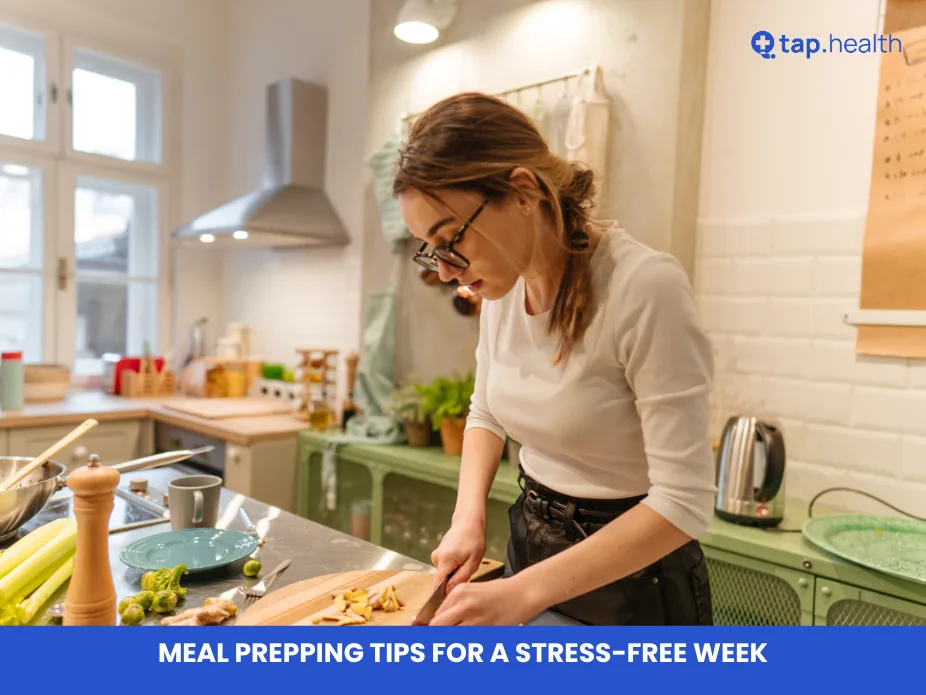In today’s busy world, finding time to prepare healthy meals can be a challenge. Whether you’re juggling work, school, or family commitments, cooking every day can quickly become overwhelming. But there’s an easier way to stay on track with your health goals and reduce the daily stress of meal planning: meal prepping.
Meal prepping is the practice of preparing meals (or parts of meals) ahead of time so that you’re ready to go when hunger strikes. It’s a game-changer for those who want to eat healthier, save time, and eliminate the stress of last-minute meal decisions. In this blog post, we’ll explore practical meal prepping tips for a stress-free week.
Real-life scenarios. Expert contributions. Recommendations grounded in proven research and facts. Factual and reliable information.
Why Meal Prepping Makes Your Week Easier
Meal prepping isn’t just about cooking all day on Sunday—it’s about being organized and making your life easier during the week. Here’s why it works:
- Saves Time: By preparing ingredients or meals ahead of time, you don’t need to spend long hours cooking each day.
- Reduces Stress: Having meals ready to go means fewer decisions to make during busy moments. You’ll know exactly what’s for dinner.
- Supports Healthy Eating: Meal prepping helps you avoid impulse decisions, like grabbing unhealthy takeout or snacks. When your meals are ready, you’re more likely to stick to your nutrition goals.
- Saves Money: Preparing meals in advance reduces the temptation to eat out, which can save you money in the long run.
Meal Prepping Tips for a Stress-Free Week
Meal prepping is an incredibly effective way to make your life simpler. With a bit of planning, you can set yourself up for a week of delicious, healthy meals that take little effort to put together. Below, we’ll go over a few practical tips for mastering meal prep and making it work for your lifestyle.
1. Plan Your Meals for the Week
Why it works: Meal planning is the first step toward effective meal prepping. If you don’t know what meals you need to prepare, it’s hard to make an efficient shopping list or cooking schedule.
Real-life scenario: Rachel, a working professional, used to rush to the grocery store every couple of days, unsure of what she’d cook that week. After starting to plan her meals, she found that her shopping trips became much quicker and more organized.
Expert contribution: According to the Academy of Nutrition and Dietetics, meal planning helps you make healthier choices, stick to your budget, and ensure you’re getting the nutrients you need.
Tip: Set aside a few minutes each weekend to plan your meals for the upcoming week. Write down your meals for each day, and make a shopping list of the ingredients you’ll need.
2. Prep Ingredients, Not Just Meals
Why it works: Instead of fully preparing meals, prepping ingredients can save you time during the week while still offering flexibility. If you chop vegetables, cook grains, or marinate proteins in advance, you’ll cut down on prep time when it’s time to cook.
Real-life scenario: John likes to cook but doesn’t have time to start from scratch every day. He preps his veggies, quinoa, and chicken at the start of the week. By midweek, he only needs to assemble the ingredients and cook them in a few minutes, keeping things stress-free.
Expert contribution: Health experts at the Mayo Clinic recommend batch-cooking and preparing key ingredients, like vegetables and whole grains, so they can be mixed and matched for different meals throughout the week.
Tip: Spend 30 minutes to an hour washing, chopping, and storing ingredients like vegetables, fruits, or grains. This allows you to assemble meals in minutes without doing all the prep work every time.
3. Invest in Quality Storage Containers
Why it works: To make meal prepping effective, you need containers that can hold your meals and ingredients securely. The right containers also help keep food fresh for longer periods.
Real-life scenario: Melissa used to struggle with storing prepped meals because her containers weren’t airtight, and the food would go bad quickly. After upgrading to high-quality, airtight containers, her meals stayed fresh throughout the week.
Expert contribution: According to a study published in Food Quality and Preference, proper food storage helps preserve the taste and nutrients of prepped meals, making them taste fresher for longer.
Tip: Invest in stackable, BPA-free containers that are microwave- and dishwasher-safe. Glass containers are often a great option because they’re durable and can store a variety of foods without staining.
4. Batch Cook Your Proteins
Why it works: Protein is often the most time-consuming part of meal prep. Cooking large batches of protein—whether it’s chicken, turkey, tofu, or beef—can make meal prep easier and faster.
Real-life scenario: Mark, who works long hours, used to cook chicken every day for lunch. He started batch-cooking chicken at the beginning of the week, which saved him hours and ensured that he always had a protein source ready to go.
Expert contribution: According to nutrition experts from Harvard T.H. Chan School of Public Health, lean protein is essential for building muscle, repairing tissues, and keeping you feeling full. Prepping protein in advance ensures you always have a healthy meal component on hand.
Tip: Cook several servings of protein, such as grilled chicken breasts or roasted tofu, in the oven or on the stovetop. Store them in the fridge and use them throughout the week.
5. Choose Simple, Balanced Meals
Why it works: When you’re meal prepping, it’s important to focus on simplicity. Meals that are easy to prepare and don’t require complex ingredients are more likely to be something you can actually stick to throughout the week.
Real-life scenario: Jenny, a college student with a packed schedule, used to overcomplicate her meal prep by trying fancy recipes. She realized that simple dishes like stir-fries, salads, and grain bowls were easier to prepare and still tasted delicious.
Expert contribution: Nutritionists suggest focusing on a balance of macronutrients—protein, carbs, and healthy fats—in every meal. This ensures you’ll be satisfied, energized, and well-nourished without spending hours in the kitchen.
Tip: Choose simple recipes that combine a protein, vegetable, and whole grain. For example, a roasted chicken breast with quinoa and steamed broccoli is a balanced meal that’s easy to make in bulk.
6. Make Use of Freezer-Friendly Meals
Why it works: Freezer meals can be a lifesaver for busy weeks when you don’t have time to cook. By freezing portions of meals, you can store them for longer periods and have them ready when you need them most.
Real-life scenario: Adam and his wife, who are both always on the go, prepare several freezer-friendly meals—like soups, casseroles, and chili—every month. When things get hectic, they simply pull a meal out of the freezer, reheat it, and enjoy.
Expert contribution: The U.S. Department of Agriculture (USDA) recommends freezing leftovers or pre-cooked meals to prevent food waste and save time during the week.
Tip: Make a double batch of your favorite meals and freeze individual portions. When you’re in a rush, you can quickly reheat a healthy, home-cooked meal in minutes.
7. Keep Snacks Prepped and Ready
Why it works: Snacks are often the hardest part of staying healthy during a busy week. Having snacks prepped and portioned out makes it easy to grab something nutritious when hunger strikes between meals.
Real-life scenario: Katie, a busy freelance writer, prepares snack packs with fruits, nuts, and yogurt in advance. She keeps these in the fridge or her bag, ensuring she always has a healthy option ready to go.
Expert contribution: Registered dietitians recommend keeping healthy snacks like fruits, nuts, seeds, or yogurt available to curb hunger and avoid unhealthy food choices.
Tip: Pre-portion snacks into small containers or bags. Some great snack ideas include cut veggies with hummus, a handful of almonds, or Greek yogurt with berries.
Frequently Asked Questions (FAQ) on Meal Prepping Tips for a Stress-Free Week
1. How long can I keep meal-prepped food in the fridge?
Most meal-prepped food can be stored in the fridge for 3-4 days. If you plan to prep for longer periods, freezing meals can extend their shelf life.
2. Can I meal prep for the entire week?
Yes! Many people successfully meal prep for the entire week. If you’re prepping meals for more than a few days, consider freezing some meals to maintain freshness.
3. How do I make my meal prep more interesting?
Switch things up by changing your protein sources, using different grains, or experimenting with herbs and spices. You can also prepare different vegetables and sauces to add variety.
4. Can I meal prep breakfast too?
Absolutely! Breakfast can be prepped too. Try overnight oats, chia pudding, or breakfast burritos that can be quickly reheated in the morning.
5. How do I avoid food waste with meal prep?
Plan your meals carefully and make sure you’re storing your prepped ingredients properly. Freezing leftovers or making smaller portions can also help reduce food waste.
Conclusion
Meal prepping doesn’t have to be complicated or time-consuming. By following these simple meal prepping tips, you can save time, reduce stress, and make healthy eating a breeze throughout the week. Whether you choose to prep entire meals or just ingredients, the key is to stay organized and plan ahead.
With a little bit of effort upfront, you’ll be able to enjoy nutritious, homemade meals that are ready to go when you need them the most. So go ahead, start prepping, and enjoy a stress-free week of eating!



